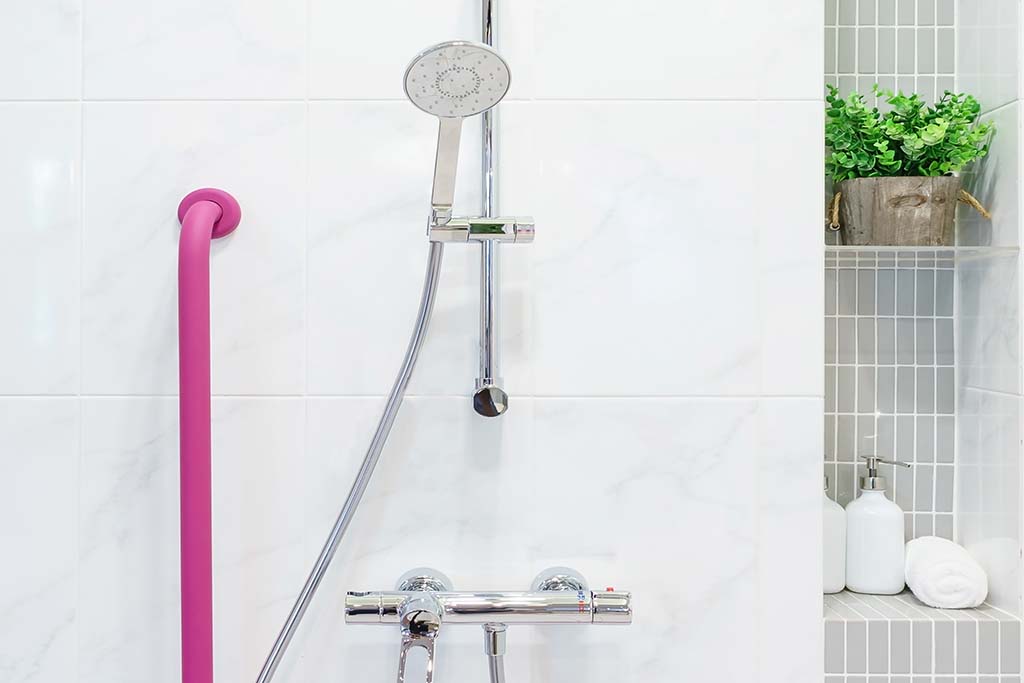Inclusive Bathroom and Kitchen Products Market Report – UK 2018-2022
Available as an Instant Download PDF
The 4th edition of the ‘Inclusive Bathroom and Kitchen Products Market Report’ contains a detailed assessment of the inclusive bathroom and kitchen products market with interpretation of major developments and future trends.
£700.00 Exc. VAT
The 4th edition of the ‘Inclusive Bathroom and Kitchen Products Market Report – UK 2018-2022’ contains a detailed assessment of the inclusive bathroom and kitchen products market with interpretation of major developments and future trends. Written by marketing professionals with considerable experience of the bathroom products industry, this report provides suppliers with a detailed and comprehensive review of this developing market.
Key content covered in the report:
- Inclusive Bathroom and Kitchen market size by volume and value, rates of change, trends and forecasts through to 2022.
- Product reviews – WC facilities, taps and mixers, baths, showering facilities, bathrooms accessories, kitchen facilities – sector size, product trends.
- Key suppliers – market position and company profiles.
- Distribution channel shares including direct sales, merchants, specialists and online retailers.
Areas of particular interest:
- Growing demand for inclusive bathroom and kitchen products as the population ages and the number of people with disabilities increase.
- The number of multi-generational households in the UK is also increasing.
- In the inclusive bathrooms sector, wetrooms and walk-in level access showering areas will progressively replace baths.
- Inclusive bathroom and kitchen products have become much more aesthetically pleasing.
- Around half a million UK households lack the home adaptations that they need. Almost half of these home adaptations are for bathroom or kitchen areas.
- Inclusive kitchens are predominantly used by wheelchair users and will be custom-built solutions tailored specifically to the homeowner’s requirements.
- Detailed market data and insight on the inclusive bathroom and kitchen products market by Barbour ABI, a leading UK provider of construction market intelligence.
Companies included:
Abacus Healthcare, Able Access UK, Absolute Mobility, AKW, Aqua Padding, Aquability, ASM Medicare, Astor Bannerman, Bathex, Bemis, Bristan Group, Carron Bathrooms, Celmac, Chiltern Invadex, Contour Showers, Croydex, Design Matters, Easibathe, Franke Sissons, Gainsborough Baths, Geberit UK, Gordon Ellis, Grohe, Hafele UK, Home Independence Services, Howden Joinery, Ideal Standard UK, Impey Showers, Independent Bathing Company, Intatec, Keuco, Kingkraft, Kohler Mira, Lakes Bathrooms, Laufen, Lecico, Magnet Trade, Methven UK, Moores Furniture Group, Mountway, N&C Phlexicare, Nationwide Mobility, Neaco, NymasPDS Hygiene, Pegler Yorkshire Group, Pland Stainless, Practical Bathing, Premier Care in Bathing, Pressalit Care, Procare, RAK Ceramics UK, Redring, Regency Adapted Kitchens, Renaissance Baths, Rise and Lower Company, Rixonway Kitchens, Roca, Scanflex, Softley Kitchens, Sunrise Medical, Sync Living, The Symphony Group, Total Hygiene, Triton Showers, Twyford Bathrooms, VitrA UK, Whale Pumps, and more.
Market Overview
- Overall market size by value, rates of change, current trends and market prospects, key criteria of influence etc. Forecasts through to 2022.
- Social and demographic trends, ageing population – including growth of population in 65+ age category, numbers who are age 85+, proportion of elderly people living alone, life expectancy trends, demand for home adaptations by type, multi-generational living etc.
- Disabled population – statistics and trends, care in the community, Disabled Facilities Grant, Better Care Fund etc.
- Legislative changes – including Document Part M and Document Part G requirements, BEAB Care Mark, RNIB Approved Product, The Care Act etc.
- Application mix – end-use sectors, e.g. residential and non-residential applications.
- Residential – including housing stock and new housing, private housing, social housing, housing for older and disabled people, residential and nursing homes.o Non-residential – including overall performance and forecasts, health, education, entertainment and leisure sectors etc.
Product Mix
- Overall product mix – by value and share 2017.
- Product issues – safety, restricted bending and reach, limited hand dexterity, visual clarity, memory, size and weight etc.
- Key design trends by bathroom product sector – importance of safety features, thermostatic control, Doc M requirements, shift towards wetroom solutions and walk-in showering areas, movement towards more stylish shapes, ergonomic designs for ease of use, digital technology, hygiene concerns etc.
- Key design trends by kitchen product sector – importance of the layout in kitchen design, bespoke design, automatic rise & fall units, remote sensor operated taps and mixers, shallow depth sinks, large/deep storage drawers, linear induction hobs, ‘slide and hide’ ovens etc.
Supply and Distribution
- Market shares of leading inclusive bathroom and kitchen product manufacturers.
- Review and analysis of leading suppliers, including company profile, turnover, key product areas etc. Summary of 50+ other specialist suppliers.
- Distribution structure – direct sales, merchants/distributors, other channels of supply.
- Key channels, e.g. direct sales – including specialists who supply direct, services offered; Merchants/Distributors – key companies, brands supplied etc. Other channels – Home improvement multiples, mail order catalogues, online retailers.
The inclusive bathroom and kitchen products market experienced sustained growth in 2016, although at a lesser pace than 2015. In the second half of the year the ‘Brexit effect’ had started to take hold, with consumer and business confidence waning. However, in 2017 market growth was more positive, despite economic uncertainty surrounding the UK plans to exit from the EU. The higher level of housing completions supported demand for inclusive bathroom and kitchen products at this time.
The inclusive bathroom and kitchen market has been positively impacted the trend towards product solutions that are suitable for all users. As such, inclusive bathroom and kitchen products have become much more aesthetically pleasing. The focus is on functionality, but style is also now an equally important consideration. Consumers are demanding attractive designs that will ‘future-proof’ and add value to their property; and are also suitable for all family members to use.
Consumer demand for inclusive bathroom and kitchen products is growing as the population ages and the number of people with disabilities increase. Improvements in healthcare and lifestyles mean the UK population is getting older. The number of multi-generation households in the UK is also increasing. The fastest growing household type in 2017 is households containing two or more families. The shortage of affordable housing and elderly relatives in need of care are driving more families to house three generations in one property.
With an increasing number of elderly and disabled people in the UK, the growing demand for inclusive bathroom and kitchen products looks set to continue. Solid levels of growth are expected to continue until 2022, with the market expected to be stronger at the end of that period. The market will benefit from very large demand for disability adaptations in existing homes.
- Contents Listing
- 1. INTRODUCTION 7
- 1.1 BACKGROUND 7
- 1.2 SOURCES OF INFORMATION 7
- 2. SUMMARY & MARKET PROSPECTS 9
- 2.1 SUMMARY 9
- 2.2 KEY TRENDS 10
- 2.3 MARKET PROSPECTS 11
- 3. ECONOMIC ENVIRONMENT 12
- 3.1 GDP 12
- 3.2 INFLATION & INTEREST RATES 13
- 3.3 UNEMPLOYMENT 14
- 3.4 HOUSEHOLD CONSUMPTION 15
- 3.5 HOUSING & CONSTRUCTION 15
- 3.6 STERLING 16
- 3.7 POPULATION PROFILE 16
- 3.8 CONCLUSIONS 17
- 4. UK INCLUSIVE BATHROOM AND KITCHEN MARKET 18
- 4.1 DEFINITION 18
- 4.2 MARKET OVERVIEW 18
- 4.2.1 Market Size & Background 18
- 4.2.2 Market Prospects 20
- 4.3 MARKET TRENDS 21
- 4.3.1 Ageing Population 21
- 4.3.2 Disabled Population 24
- 4.3.3 Home Adaptations 25
- 4.3.4 Multi-Generation Living 26
- 4.4 LEGISLATION AND APPROVALS 27
- 4.4.1 Document Part M / Lifetime Homes 27
- 4.4.2 Document Part G 28
- 4.4.3 BEAB Care Mark / RNIB Approved 29
- 4.4.4 The Care Act 29
- 5. PRODUCTS 31
- 5.1 OVERALL PRODUCT MIX 31
- 5.2 PRODUCT ISSUES 32
- 5.3 BATHROOM PRODUCT TRENDS 33
- 5.3.1 Toilet Facilities 33
- 5.3.2 Baths 36
- 5.3.3 Bathroom Taps and Mixers 37
- 5.3.4 Showering Facilities 39
- 5.3.5 Bathroom Accessories 42
- 5.4 KITCHEN PRODUCT TRENDS 44
- 5.4.1 Kitchen Furniture 44
- 5.4.2 Worktops 45
- 5.4.3 Sinks and Taps 46
- 5.4.4 Appliances 47
- 6. END USE SECTORS 48
- 6.1 SECTOR OVERVIEW 48
- 6.2 RESIDENTIAL 48
- 6.2.1 Private Housing 49
- 6.2.2 Social Housing 50
- 6.2.3 Residential Housing for Older and Disabled People 50
- 6.2.4 Residential Care and Nursing Homes 51
- 6.3 NON-RESIDENTIAL CONSTRUCTION 52
- 6.3.1 Health 54
- 6.3.2 Education 55
- 6.3.3 Entertainment and Leisure 56
- 6.3.4 Other Sectors 57
- 7. SUPPLIERS 59
- 7.1 MARKET SHARES 59
- 7.2 KEY SUPPLIERS 59
- 7.3 OTHER SUPPLIERS 62
- 8. DISTRIBUTION 67
- 8.1 DISTRIBUTION STRUCTURE 67
- 8.2 DIRECT SALES 67
- 8.3 MERCHANTS 68
- 8.4 DISTRIBUTORS 70
- 8.5 HOME IMPROVEMENT MULTIPLES 70
- 8.6 ONLINE RETAILERS 70
- 9. INSTALLATION AND SPECIFICATION 72
- 9.1 INSTALLATION 72
- 9.2 SPECIFICATION 72
- 9.2.1 Refurbishment 72
- 9.2.2 New Build 73
- Tables & Charts
- CHART 1: UK INCLUSIVE BATHROOM & KITCHEN PRODUCTS MARKET BY VALUE AND FORECASTS (£M MSP) 2013-2022 9
- TABLE 2: GDP DATA – 2015-2017 – KEY CONSTITUENT ELEMENTS 12
- CHART 3: INTEREST RATES AND INFLATION (CPI) FROM 2000-2022 14
- CHART 4: PDI & SAVINGS RATIO AT CURRENT PRICES 2000-2022 15
- TABLE 5: EXCHANGE RATE FLUCTUATIONS 2014-2020 – STERLING TO THE DOLLAR, AND THE EURO, SPOT RATES 16
- TABLE 6: UK INCLUSIVE BATHROOM & KITCHEN PRODUCTS MARKET BY VALUE (£M MSP) 2013 -2022 19
- CHART 7: UK INCLUSIVE BATHROOM & KITCHEN PRODUCTS – PRODUCT MIX BY VALUE 2017 19
- CHART 8: UK POPULATION IN 65+ AGE CATEGORY 1976 – 2046 22
- CHART 9: UK HOUSEHOLD TENURE FOR 65+ AGE CATEGORY 2017 23
- CHART 10: LIFE EXPECTANCY AT BIRTH BY GENDER 1991 – 2036 24
- TABLE 11: TYPICAL BATHROOM AND KITCHEN ADAPTATIONS AND AVERAGE COSTS 25
- CHART 12: UK MULTI-GENERATIONAL HOUSEHOLDS 2007-2017 BY VOLUME (000S) 26
- CHART 13: UK INCLUSIVE BATHROOM & KITCHEN MARKET – PRODUCT MIX BY VALUE 2017 31
- TABLE 14: UK INCLUSIVE BATHROOM & KITCHEN MARKET BY PRODUCT CATEGORY 2017 (£M MSP) 32
- CHART 15: INCLUSIVE BATHROOM & KITCHEN PRODUCTS BY END USE APPLICATION – RESIDENTIAL AND NON-RESIDENTIAL 2017 48
- TABLE 16: UK DWELLING STOCK IN ENGLAND BY TENURE (000’S) 2010 – 2016 49
- CHART 17: CONSTRUCTION OUTPUT (GREAT BRITAIN) NON-RESIDENTIAL – NEW WORK AND RMI CURRENT PRICES (£BN) 2012 -2021 52
- CHART 18: NON-RESIDENTIAL CONSTRUCTION OUTPUT NEW WORK ANALYSIS BY SECTOR 2017 AND 2021 – % BY VALUE GB 53
- CHART 19: HEALTH OUTPUT AND FORECASTS 2012 TO 2021 – BY VALUE (£ BILLION AT CURRENT PRICES) 54
- CHART 20: EDUCATION OUTPUT AND FORECASTS 2012 TO 2021 – BY VALUE (£ BILLION AT CURRENT PRICES) 55
- CHART 21: ENTERTAINMENT & LEISURE OUTPUT AND FORECASTS 2012 TO 2021 – BY VALUE (£ BILLION AT CURRENT PRICES) 56
- TABLE 22: UK INCLUSIVE BATHROOM & KITCHEN SUPPLIERS – MARKET SHARES BY VALUE 2017 59
- CHART 23: INCLUSIVE BATHROOM & KITCHEN PRODUCTS MARKET % CHANNEL SHARE 2017 67

Paired Report Discount
Save £250 for every two reports you buy
Discount applied in basket
Frequently bought together
Trusted by industry leaders
For more detailed requests speak to our research experts directly
By using this form you agree that your data will be processed and protected in line with our Privacy Policy.
Research you can depend on
Our reports go deeper to give you the insights needed to make your next strategic move.
- Detailed assessment of the market – analysis of the market structure and recent developments within the market.
- Market prospects up to 4 years – market value, opportunities, impact of Covid-19, Brexit etc.
- Detailed information – market size, influences, market factors and key players.
- Analysis by product group – market size, product mix, sector trends etc.



